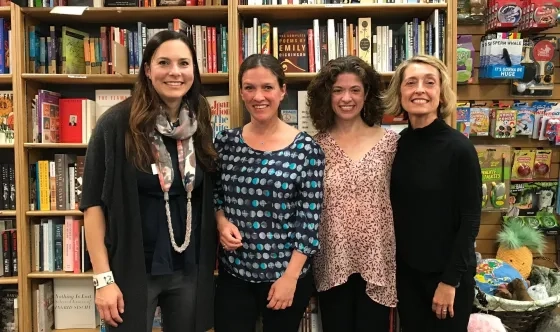SFCM Faculty Lead Public Panel on Women and Music
The discussion surrounding women’s roles in classical music—their representation among the ranks of orchestras, the differences between the musical landscape of yesteryear and today and the hurdles that still must be crossed—is one that has recently seen a spotlight shone down on it. With the topic of gender disparity and the #MeToo phenomenon taking center stage in our national discourse, the classical music world has seen a revitalized interest in tackling the issues women have been facing for decades. On Monday, May 20, SFCM, in partnership with Alta Magazine, a quarterly publication that takes on the issues, culture, personalities, politics, lifestyle, and history of California and the West, aimed to delve into that very discussion.
The panel, moderated by Indre Viskontas and featuring additional SFCM faculty members Cordula Merks and Nicole Paiement, as well as San Francisco Symphony violinist Melissa Kleinbart, was focused not only the perceived problems and challenges facing female musicians (and those who identify as female), but also solutions that lead to more equality across the board.
One of these issues affecting orchestral makeup is the audition process. For the past few decades, it has become commonplace for musicians to audition behind a curtain, even walking on stage on a carpet, to better mask the players' genders and keep judges’ preconceived notions at bay.
“I definitely think that blind auditions play a huge role in getting women into the orchestra,” commented Kleinbart. She noted that, since the ’70s, orchestras have been doing this, and it’s benefitted ensembles as they seek to become more diverse.
However, while orchestras these days are seeing more female representation as a whole, the representation of women in leadership positions (e.g. concertmaster, section leaders) is not reflective of the general sense of diversity.
“Traditionally, in the United States, it used to be, basically, a conductor hiring his—his, always—concertmaster,” said Merks. “Usually male, also.”
Gender disparity is even more apparent in the conducting world, but with strong female voices like Paiement, Susanna Mälkki, and Marin Alsop acting as role models for young women conductors, this landscape is changing, too.
Regarding leadership is the orchestra world, changes can even be seen through the SFCM community. Ani Bukujian ’18 recently won the principal second violin spot in the San Francisco Ballet Orchestra and Meredith Kufchak ’16 recently became principal viola of the Dallas Symphony.
“I think one of the problems is that we are so ingrained in such an old tradition of music, it is hard to think of women being leaders,” said Paiement. “I do think things are changing. They are changing slowly because I think, in some ways, slow changes are sometimes deeper.”
Viskontas additionally asked Merks if she thought about her gender much in her duties as a conductor.
“I’m trying not to think about it,” she said. “One of the things that I love most about music, and also about playing in an orchestra, is that we can work together with people of different genders, different colors, different ages—it really does not make a difference.”
Throughout the conversation, it became clear that the panelists were musicians who looked forward to the time when the entire discussion about women in classical music would be irrelevant. The positive changes seen in these past years are perhaps an indication that that day may be in sight.
SFCM alumna Ayslin Rice ’19, an attendee, is one of those looking to make changes. She recently performed a solo recital that included a program composed only of works by women composers.
“I really like it when people talk about women composers in music,” said Rice. “I feel like it’s something that we need to discuss a lot so that it can progress as much as possible. I liked that they mentioned it.”
“I work in tech and it’s the same story wherever you go,” remarked another attendee, Erin Smith. “At the bottom, it’s 50/50 females/males, and then you get to the top and it dwindles. Something that we try to focus on in tech is that, when you have a platform, bring other women up with you. Women hiring other women … helping pull each other up.”
And, of course, the music world benefits from this, as well. Merks, after giving birth last year, tapped a student, Boxianzi Ling ’20, to sub for her in the concertmaster role for the Ballet Orchestra. It seems “women helping women” is an agreeable attitude in any discipline.
